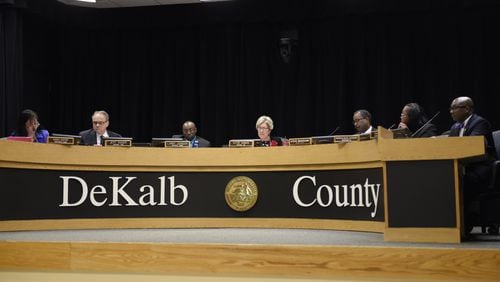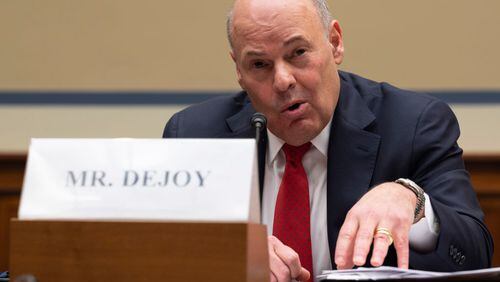DeKalb County commissioners agreed Tuesday to funnel $180 million into roads, utilities and other infrastructure at the former General Motors plant in Doraville, a commitment developers say will lead to 500 jobs in the near future and perhaps 8,000 eventually.
Developers envision transforming the 165-acre site from piles of rubble to a thriving business district called Assembly, with offices, shops, residences, parks and film studios.
It's been nine years since General Motors shut down the plant, located inside the Perimeter near Spaghetti Junction. The Integral Group and its business partners bought the property for $50 million in 2014 and began negotiations with three local governments to pay for public infrastructure. Company officials say the improvements are necessary to attract businesses.
Tuesday, the DeKalb Commission voted 7-0 to support the project with public funds that will pay for a covered street to the Doraville MARTA Station along with roads, grading, utilities, public parking and related improvements.
As a result, an unnamed company has pledged to move 500 jobs to the site, said Eric Pinckney, an executive for The Integral Group, the site's developer. The city's plans call for adding more than 8,000 jobs over time.
“This was the final hurdle,” Pinckney said of the vote. “This is a huge step forward to fulfilling the vision the community has created for this site.”
But not all of the community has been on the same page.
Since developers bought the property, public officials have debated whether to spend public money backing a private business project.
After the DeKalb school system refused to help support the project financially, the city of Doraville and DeKalb County governments went ahead without the schools' backing.
The complicated deal raises $180 million for infrastructure, less than the $247 it would have brought in if the school system also contributed its tax resources. That’s still enough to build out the site for businesses eager to move there, said Doraville City Manager Shawn Gillen.
The DeKalb Commission’s vote creates a financing mechanism called a tax allocation district, which will leverage anticipated future tax revenue to sell bonds to pay for the infrastructure.
The Integral Group and businesses located there will continue to pay property taxes at current levels — more than $678,000 last year. As companies move onto the site, its tax value will increase, resulting in higher taxes that will be used to pay off the bonds.
“It’s one of those watershed moments,” Gillen said. “If the school district were on board, we’d already have shovels in the ground. But it’s getting done. Some people would have given up by now.”
Critics of the deal worry the project will cost more than it’s worth. Trudy Jones Dean, a former Doraville city councilwoman, said the development is speculative and could overburden city services.
“They should have to make sure this project will work out,” she said. “I don’t think they have considered the increase in services that will be necessary.”
Even though the school system isn’t part of the TAD, tax money that would have otherwise gone toward public education is nevertheless being diverted to the development. That’s because the Doraville Development Authority approved a 35 percent property tax break in August that cuts into school, county and city revenue.
The money generated from the tax breaks will be spent on public infrastructure through a mechanism called a community improvement district, which allows businesses to put their taxes toward specific projects.
Revenue from the tax allocation district and community improvement district will together fund the $180 million in infrastructure.
With interest, the amount of public investment could exceed $250 million through 2047. Bond investors, not taxpayers, will be responsible for costs if the site’s business plan fails and the property loses value.
Developers had warned that the site could become a piecemeal mix of car dealerships, apartments and other businesses without government financing.
Instead, the public support will help attract $1.5 billion in private investment, add residences and increase daily MARTA ridership by more than 30,000, according to developers. So far on the site, a car dealership and a film complex called Third Rail Studios have opened.
The area could be similar to Atlantic Station in Midtown, but bigger and more commuter friendly, with the potential to house corporate headquarters, medical facilities, start-ups, restaurants and more, Doraville officials say.
“The Doraville plant has been a vacant eyesore,” said DeKalb Commissioner Greg Adams, whose super district includes the area. “To come up with a project to beautify DeKalb County will move this county forward. It will create jobs.”
How tax allocation districts work
A tax allocation district, or TAD, is a financing mechanism for local governments to help pay for infrastructure for development projects.
With a TAD, governments agree to freeze the amount of property tax revenue each receives from the area. Any additional tax revenue generated by rising property values funds the redevelopment project.
For the Assembly project in Doraville, the TAD could help fund up to $180 million in infrastructure improvements to make the site ready for businesses to locate there. The TAD expires either after 30 years or when the $180 million is spent. Afterward, the governments would receive all the taxes from the development.
Improvements for Assembly project
- $58 million: Covered street to the Doraville MARTA station
- $33 million: Streets and utilities
- $30 million: 1,500 public parking spaces
- $17 million: Grading and water detention
- $15 million: Campus square
- $6.9 million: Concrete demolition and foundation removal
- $5.1 million: West Avenue
- $4.4 million: Previously completed work and fees
- $4.4 million: Engineering and design fees
- $4 million: Remediation
- $2 million: Park amenities
Total: About $180 million plus interest
About the Author









